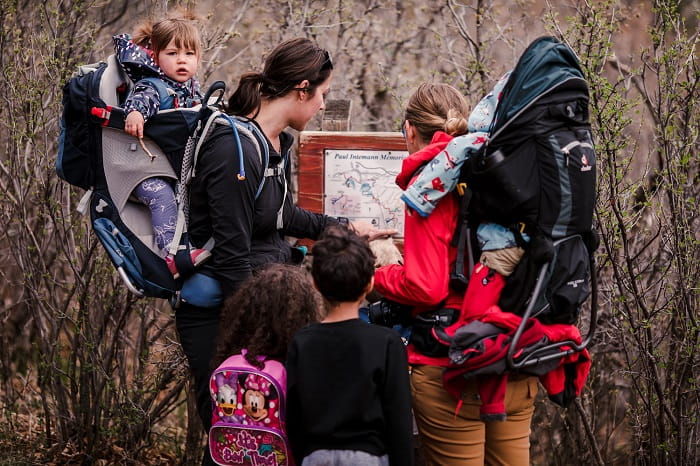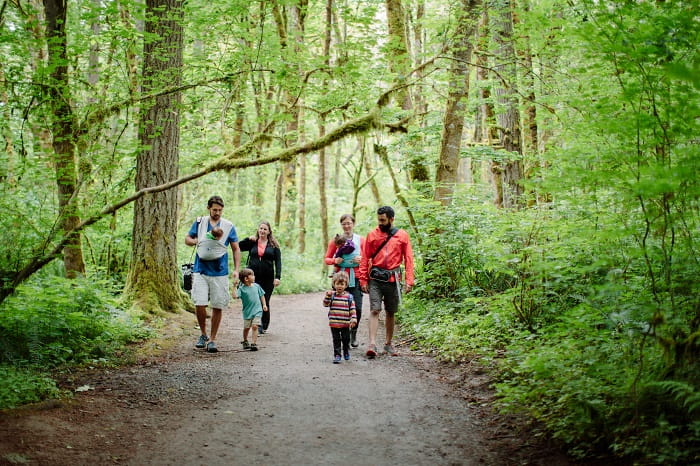8 tips for the perfect hike with kids
By American Heart Association News

When Shanti Hodges had her son, all she wanted was a group of people to join for a hike.
She couldn’t find one, so she organized her own and invited friends. Five moms came the first week. Eleven the next, then 15.
She gave it a name, and Hike it Baby(link opens in new window) has turned into a national movement of tens of thousands of parents, grandparents and guardians taking kids onto the trails for fresh air, exercise and community.
“If you give parents healthy, strong resources and strong inspiration, it becomes a family habit,” said Hodges, who recently wrote a book on family-friendly hikes(link opens in new window). “Getting out in nature shifts your attitude. It shifts your attitude to the planet, to your children’s health, your partner’s health. It really raises your spirits.”
Thanks to Hike it Baby, about 16,000 people now regularly join groups around the country on about 2,000 hikes a month.
“Fresh air and exercise are two things we should try to get each day, and hiking is a great option,” said Dr. Stephen R. Daniels, pediatrician-in-chief at Children’s Hospital Colorado and a spokesperson for the American Heart Association’s Healthy for Good. “It is important for kids to find activities that they like, and support from their parents is also key to being able to maintain a commitment to regular physical activity.”
Simply breathing in nature can lead to a healthier mind, body and spirit. Not sure how to start? Here are eight tips for a successful family hike.
1. Prioritize mellow terrain and safety. If you’re a new parent, or your child is old enough to run ahead, you’ll want to go somewhere you know the terrain is gentle, said Hodges. Find a hike that doesn’t have too much loose rock, big ledges or drop-offs. If you’re going to regularly lead hikes, consider taking an AHA Heartsaver First Aid class to learn how to handle everything from insect bites to cardiac arrest.

2. Embrace water features or other distractions. Hopping from mud puddle to mud puddle can add some serious mileage to your hike. Let kids play in one, then encourage them to find another up the trail, Hodges said. If it’s a dry day, you can conduct a similar search for small rocks, interesting roots or some other consistent feature.

3. Look for educational signs. Find trails with signs explaining the nature around you. In addition to learning something new, they also encourage forward movement or slow down the quick walkers.
4. Scope out shade or structures. Look for hikes with shade – from the sun or rain – at the beginning and end. Benches along the way are also a plus.
5. Bring snacks. Carry an arsenal of healthy snacks like oat avocado-berry breakfast bars(link opens in new window). If you’re in a group with other parents and kids, bring enough to share, said Hodges, because children will inevitably want their friends’ snacks and vice versa.
6. Find an age-appropriate group. Stave off “I’m bored” by hiking with other kids of a similar age, Hodges said. They will encourage each other to keep going.
7. Know your child’s meltdown point. Some days, your kids are going to do really well and other days not so much, Hodges cautioned. Lower your expectations and know some hikes will be a quarter-mile and some might be a few miles or longer.
8. Stick with it. “If you feel like your toddler or baby isn’t into hiking, keep trying and trying and trying, because it has an incredible benefit for the whole family,” said Hodges. Plus, sometimes the best memories are made when things don’t go as planned.

If you have questions or comments about this story, please email [email protected].





